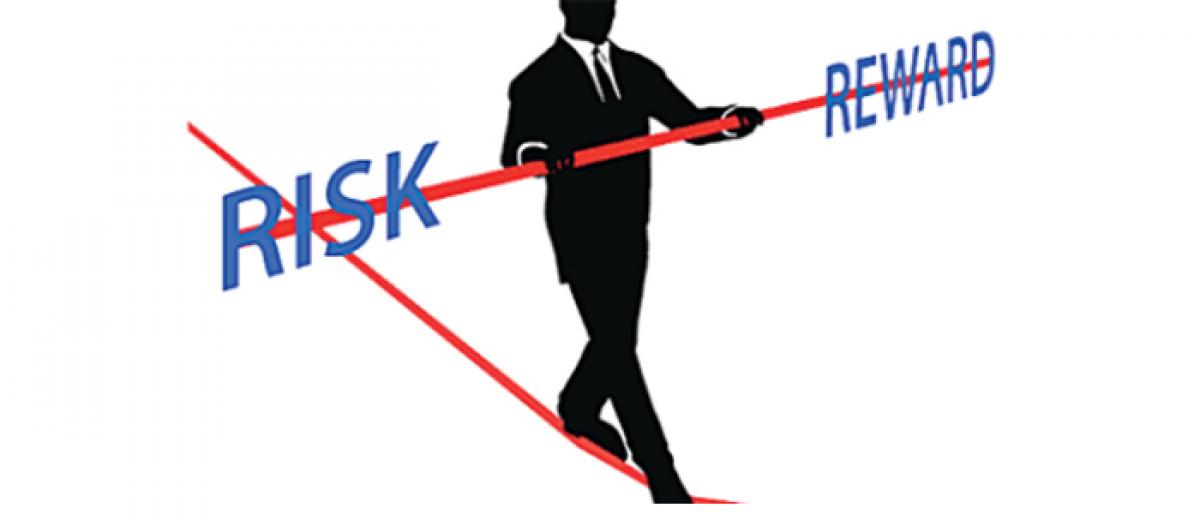Live
- Kishan Reddy Slams Telangana Government, Criticizes Congress and BRS
- Lawyers demand urgent implementation of Protection Act
- Cotton farmers protest fraud in weighing process
- Faculty allegedly rags 1st yr student at Govt Med College
- Mini libraries at tribal welfare hostels soon
- Range-bound trading on positive bias
- Weekly, daily MACD shows strong bearish momentum
- Markets hovering in directionless mode amid lack of triggers
- Epilepsy: Spreading awareness & inspiring support
- Courtroom Drama Udvegam Promises to Be a Unique Cinematic Experience
Just In

Why the market falls occupy more of our brain spaces, did we do the same when the markets went up When the going is good, all reason is left to the wind and when the going is bad, we tend to do much worse This has more to do with our psychology than our aptitude Humans tend to exaggerate and extrapolate a current situation to the extreme possibility Stock markets, despite their rational proces
Why the market falls occupy more of our brain spaces, did we do the same when the markets went up? When the going is good, all reason is left to the wind and when the going is bad, we tend to do much worse. This has more to do with our psychology than our aptitude. Humans tend to exaggerate and extrapolate a current situation to the extreme possibility. Stock markets, despite their rational process, are just a collective behaviour of our greed and fears.
So, when an event unfolds we tend to infer the situation to its extreme outcome and thus adjust our derived future which is reflected in the way we either trounce or pounce on a stock. The distorted future also takes in the parameters which were earlier progressive or obstacle till then to our earlier outcome would suddenly change its hue and turn a catalyst or a hiccup respectively. However, the reality is not what we define through our models, both in our brains or through computer.
Commenting about the peak of dot-com boom, Scott Mcnealy, the co-founder of Sun Microsystems had scorned how the markets priced his stock wherein, to fulfill the investors’ expectations, the company has to deliver 10 times the revenue paying up 100 per cent dividends for the next ten straight years. All this while the cost of sales is to be assumed at zero while paying no taxes (which could be illegal) and with absolutely no investment or expenses on R&D during the period. Reflecting on those events two year later, he said - “do you see how ridiculous those basic assumptions are? You don’t need any transparency. You don’t need any footnotes. What were you thinking?”
Now that the stock markets are in doldrums, people panic and react in ways that not only damages their wealth but also impedes further chances of wealth creation. How does one need to respond to these situations? Is there a thumb rule or benchmark to act in these conditions? How do we navigate these treacherous waters? Investment decisions should be always in-line with our stated goals, risk appetite and timelines, but are mostly reflective of our believed narrative.
Stock investing is not about picking the hot ones and then dumping them when they become too unbearable to hold. It’s about a disciplined approach where one assumes to have owned that part of the business. One has to understand how the various nuances of that business, the various factors that could impact that business and how well the company, it’s management and processes are equipped to deal with them.
Generating long-term returns through investing (stock or otherwise) is not easy though not impossible. It involves taking many uncomfortable risks at times with uneven results. One should be aware of the risk one is taking, assess their tolerance to these uncomfortable risks and hence should be conscious of what returns are being generated. This would lead one to avoid taking undue risks while putting a price to each risk. It’s important that one gets rewarded for those risks being taken and a periodic review is required to evaluate this. It’s vital that one should be out of an investment when they begin to feel uncomfortable beyond their tolerance. You may call it gut, but when you can’t sleep over an investment decision then better not take it at the first place.
Of course, diversification is the key. Please understand that all your investment decisions don’t turn up triumphs, and this may not be anything to do with the investment process that one adheres to but that’s the macro-factors (most out of your control) that influence the results. And as long as you are cognizant to these causes, the investment could stay put and any adjustments are to be performed only on the contrary.
(K Naresh Kumar - The author is co-founder of “Wealcoity”, a wealth management firm and could be reached at [email protected])

© 2024 Hyderabad Media House Limited/The Hans India. All rights reserved. Powered by hocalwire.com







